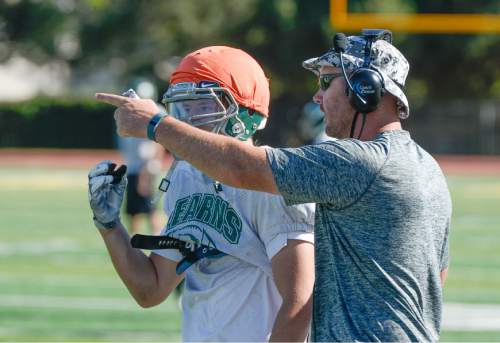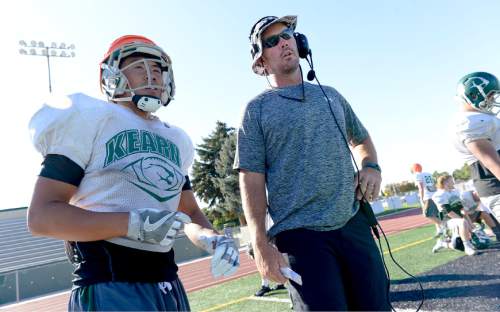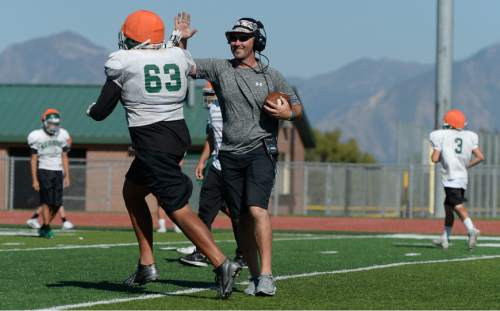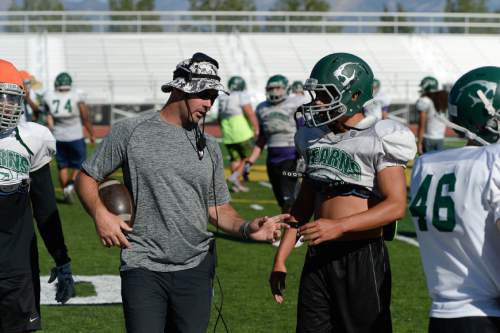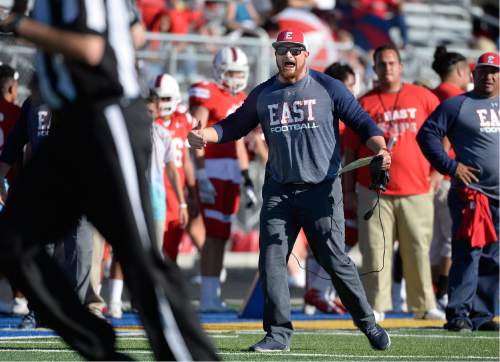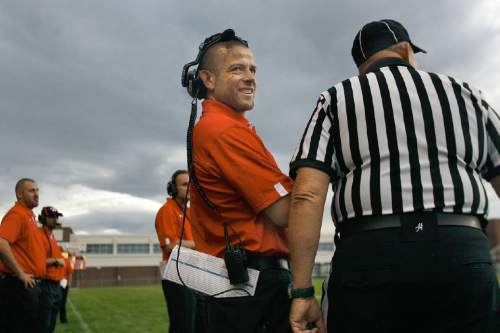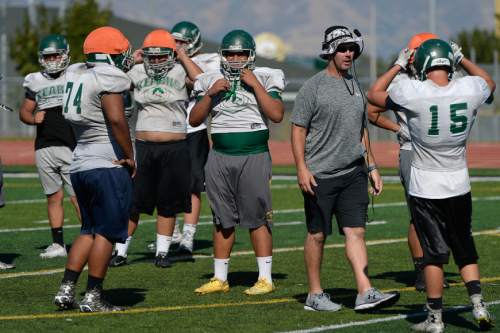This is an archived article that was published on sltrib.com in 2016, and information in the article may be outdated. It is provided only for personal research purposes and may not be reprinted.
Coaches across the state are vehemently criticizing a proposal to eliminate restrictions on high school athletes transferring between schools, saying it would create a free-for-all that encourages athletes to focus on winning and entitlement, rather than character development and overcoming adversity.
"That's probably the worst proposal I've ever heard," said Tooele coach Kyle Brady. "I think it will destroy high school athletics."
Coaches, including Weber's Matt Hammer, Desert Hills' Carl Franke and Kearns' Matt Rickards, said they would resign from coaching after this season if the proposal is accepted, because of the detrimental repercussions it would cause to high school athletics.
"I'd walk away. There's no way. I'll go back to coach college football," said Hammer, who spent seven years on the sideline at Weber State.
The Utah Board of Education is scheduled to discuss the proposal Thursday. The Utah High School Activities Association (UHSAA) currently regulates athletic transfers for its 150 member schools and their 87,000 student athletes. But if the policy is approved, the school board would prohibit public schools from participating in UHSAA unless the association dropped its transfer constraints.
Essentially, it would mark the end of the UHSAA, which would forfeit 89 percent of its member schools, according to UHSAA Executive Director Rob Cuff.
David Crandall, the school board's chairman, said Tuesday that the current system "seems to be inconsistent with students' and parents' right to choose which school they want to attend."
In addition to his role as school board chairman, Crandall serves on the governing board of Summit Academy, a Draper-based charter school whose football program received multiple sanctions in May for violating UHSAA recruiting rules, including a postseason participation ban that was later overturned on appeal.
Hammer accepted his position at Weber High to build a culture within the program, he said, and to help develop athletes from a young age. Unrestricted transfers, he said, would destroy his ability to make a difference in the community.
"That's the internal joy of what I'm getting here at Weber," he said, "compared to recruiting my a— off and never seeing my family when I was at Weber State."
Rickards said the change would make athletes less inclined to overcome adversity.
"What high school sports is for me, and many coaches around the state, is about teaching kids lessons of character, integrity, responsibility, work ethic and empathy toward others," he said. "If they go ahead with this proposal, it destroys [prep sports] at a fundamental level. Unfortunately, we're developing a mercenary type of attitude that if things don't work out for little Johnny, he can go to whatever school he wants to."
East coach Brandon Matich has been part of multiple conflicts and controversies with the UHSAA, including when the association vacated his program's region title after multiple wins were stripped because an ineligible player participated in games in 2012. While he believes the current system is flawed with too much "gray area" — which multiple coaches agreed with — he said this proposal is "crazy."
"I'm not sure you're doing what is best for the kids," Matich said. "It would create entitled families. There have to be rules in place, but those rules have to be black and white."
West Jordan coach Mike Meifu echoed that sentiment.
"It's a terrible idea. I think it's really bad, if it does pass, for high school athletics," Meifu said. "The system we have now is not perfect, but what we have is necessary."
Utah's open-enrollment law allows students to attend any school with available space. But if they also want to transfer to a different sports program after establishing their eligibility at another school, they must go through an appeal process with the UHSAA.
The proposal would allow the UHSAA to restrict undue influence on transfers for athletic purposes, but Rickards said recruiting violations aren't enforced already, and the local athletic landscape would evolve into the Wild West if preventive transfer rules are lifted.
"It doesn't fix anything. It opens the floodgates. There are holes in the system right now," Rickards said. "It's hard to keep our kids at Kearns. I struggle every year. I recruit my own kids in little league to stay at Kearns, and lose 10 to 12 kids a year to different schools."
Coaches also expressed concerns about the encumbrance the proposal places on academics, especially with midyear transfers from institutions using quartered schedules to those operating on trimesters.
"It would create chaos," Hammer said.
Several coaches said less-appealing programs in every sport would cease to exist because of lack of participation after losing transferring students, which would correlate with educators losing employment.
"Let's say a school isn't good at any athletics; all of a sudden, those teachers lose jobs because [students are] going to play somewhere else," Franke said. "It's going to ruin the landscape of education in Utah as a whole. Academics and athletics, even though they are separate — they're married some way because they have an effect on one another."
The proposal, which also would give the state school board the power to realign athletic classifications, is scheduled to be heard Thursday by the board's Standards and Assessment Committee and discussed by the full school board Friday, when many coaches and administrators are expected to express their concerns.
"I feel like there is more to high school athletics than winning games," Brady said. "I think that's what it would turn into — all about winning — not about teaching kids how to compete, how to work hard, how to be better kids, how to follow through, how to learn to deal with adversity."
Twitter: @trevorphibbs


